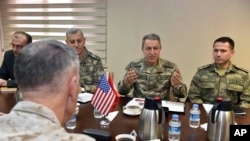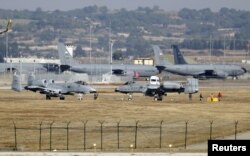The Pentagon says a diplomatic dispute between Turkey and the United States has not affected military operations or personnel out of Turkey, including efforts to defeat Islamic State militants in Iraq and Syria.
"I can confirm that these developments have not impacted our operations or personnel," Pentagon spokesman Army Colonel Robert Manning told reporters on Tuesday. “Coalition counter-IS operations out of Incirlik and other Turkish facilities are closely coordinated with and have the full support of our Turkish partners.”
Manning said the Turkish air force base in Incirlik continues to “fulfill an important role”in NATO and coalition efforts.
Since the rise of Islamic State, the U.S.-led coalition has used Incirlik Air Base as the main staging area for air attacks against IS in Syria and in northern Iraq. The facility is also used to support U.S. forces in both countries.
Counter-Islamic State flights from ships in the Mediterranean Sea also typically fly through Turkish airspace during their missions.
Relations between the NATO allies have hit a new low, with Turkey and the U.S. blocking bilateral business and tourist travel.
Last week, Turkey arrested a U.S. consulate employee and Turkish national, accusing him of regular communication with alleged leading members of what Turkey has deemed a terrorist network blamed for a failed coup against Turkish President Recep Tayyip Erdogan last year.
Following the arrest, the U.S. embassy in Ankara announced that it would temporary halt all non-immigrant visa applications - a move that was quickly mirrored by Turkey.
U.S. intelligence officials have long been concerned about increasingly strained relations between Washington and Ankara.
One factor has been Turkish frustration with the U.S. for refusing to extradite Fetullah Gulen, the U.S.-based cleric blamed by many in Turkey for engineering last year’s failed coup. Gulen has denied involvement.
Another factor has been U.S. willingness to partner with Kurdish People’s Protection Units ((YPG)) forces in Syria in the fight against the Islamic State terror group.
“Ankara calculates that the United States has empowered Turkey’s primary security threat,” according to the U.S. intelligence community’s Worldwide Threat Assessment, issued this past May.
Turkey views the YPG as just another arm of the Kurdistan Workers’ Party, or PKK, considered by both Turkey and the U.S. to be a terrorist group.
Additionally, there have been concerns about Turkey’s recent overtures to Russia.
“Ankara’s turn toward Moscow for S-400 missile defense systems and coordination to establish de-escalation zones in Idlib, Syria, highlight the difficulties,” Nicholas Glavin, an independent researcher formerly at the U.S. Naval War College's Center on Irregular Warfare and Armed Groups, told VOA.
“At its worst," he added, "two NATO allies are on the brink of fighting one another through proxies in northern Syria.”

